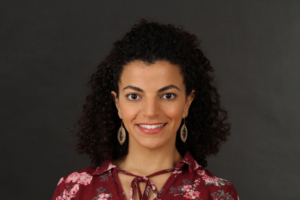For Asala Mahajna, her PhD journey was as much about personal growth as it was about scientific discovery. The years she spent at Wetsus were transformative and filled with challenges that tested her resilience but also brought unexpected joys, including finding the love of her life.
The people behind the science, and the science behind the people.
Asala’s fascination with modeling began during her undergraduate studies and later at Deltares, where she worked on leakage detection. “Modeling is like a puzzle,” she says with a smile. “It’s a challenge that’s incredibly satisfying to solve. When I’m working on a model, I’m in the zone—I have full control, and no one can stop me.”
This love for solving complex problems was nurtured from a young age. “My father always encouraged me to explore,” Asala recalls. “That curiosity is what eventually led me here.” Her PhD at Wetsus presented an entirely new challenge: applying machine learning to meta-omics data to better understand and improve process control in wastewater treatment plants (WWTPs). “I was well-suited for the research because of my background in modeling,” she explains. “But I knew very little about meta-omics when I started. I was trying my best simply googling before the job interview, but luckily they liked my programming skills.”
Microorganisms can act as living sensors, providing real-time insights into water quality and metabolic activity. In her research, Asala focused on the microbiome of activated sludge in a saline wastewater treatment plant that handles industrial waste. She looked at metatranscriptomes (genetic data), which are like a report on the active genes of microbes in the activated sludge. They are a reflection on bacterial activity, and in turn, what is floating around in the water. Asala’s study examined the composition of active genes in the bacteriota that is best at removing pollutants and the factors that influence this combination of gene activity. She discovered that not only is the variety of functional genes important for treatment performance, but also having a well-balanced, evenly distributed, and diverse set of these genes in the bacterial community boosts water cleanup efficiency. On top of that, the soon to be doctor studied the diversity of stress response genes that help bacteria survive tough conditions. Using machine learning, she assessed how environmental stressors cause specific metabolic pathways to become more active, helping bacteria maintain balance under stress. And in addition, she also discovered that the dissolved oxygen is the most important process parameter for the activated sludge microbiome performance.
For Asala, this period wasn’t just about academic breakthroughs—it was also about personal milestones. Meeting her partner during this transformative time brought unparalleled joy, grounding her amidst the challenges. Like everything fell into place, as a great support in her effort.
And her PhD journey itself also helped her uncover new strengths within. “A PhD forces you to confront your limits,” she says thoughtfully. “But it also teaches you about your talents—and your vulnerabilities. It’s not just a contribution to science; it’s a contribution to who you are as a person.” Perseverance, curiosity, and connection are a testament to how the pursuit of knowledge can transform both our understanding of the world and ourselves. And after all, changing the world starts by changing yourself.
